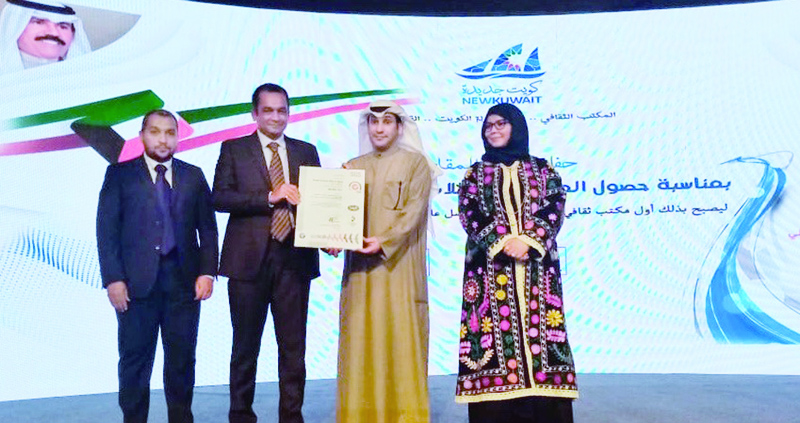
CAIRO: The Kuwaiti Cultural Office in Cairo held a ceremony, under the auspices of the Kuwaiti Minister of Education (MoE) Dr Saud Al-Harbi, over being the first Kuwaiti cultural bureau in the Middle East to win three International Organization for Standardization (ISO) certificates. Assistant Undersecretary for Administrative and Financial Affairs Lamia Al-Mulhem, in a statement on behalf of Harbi Monday night, thanked Head of Cairo's Kuwaiti Cultural Office Dr Ahmad Al-Mutairi and its workers.
Mulhem emphasized that these certificates are only the beginning of doing more for the sake of excellence and contribution to achieving Kuwait's 2035 vision and Sustainable Development Goals (SDGs) through the quality of education, which will positively reflect on the labor market's outputs. The concept of high quality goes beyond the traditional notion of work with nonstop improvement, also a futuristic vision that includes supporting the educational system and achieving excellence in institutions of higher education, which was an urgent necessity embodied by the Cultural Office in Cairo.
Meanwhile, Dr Mutairi said he was proud of Egypt's first Office, over winning ISO (9001-2015) on quality management, ISO (45001-2018) on vocational safety and 14001-2015 on environment protection. The development process in the Office was not a result of the moment, but was sought in the office since the end of 2016, indicating that the process of modernization continued throughout that period and included all cultural, academic and administrative aspects, he said. He pointed out that the world was shifting attention to a new, complete, major economy in creating wealth, indicating that educational institutions are the basis and essence of this new economy.
In the past, the capital that the nations sought were possession of natural resources, including oil, gas, minerals, agriculture and water, Mutairi continued. These wealthy resources, despite their current importance, retreated in front of the new capital, which was the economy of knowledge, based on scholars and advanced educational institutions, searching for innovations, inventions, ideas and values, he said.
The first and most important institutions in this new economy were the MoE, Ministry of Higher Education (MoHE), universities and research centers that are interested in scientific research, creativity and innovation, he mentioned. He underlined that this was a strategic and not an end goal, but rather a way that was no longer a choice and just a single option for fearlessness of Kuwait's Vision. He underscored that this quality has become a global demand that is indispensable in all countries and a challenge that mobilizes the collective efforts of various people in higher education systems.
Speaking on the sidelines of the ceremony, Egyptian Minister of Higher Education and Scientific Research Dr Khaled Abdulghaffar said that this success was evidence of the highest academic, technical work and interest in the quality of the educational process to serve students belonging to Kuwait. He admired the cooperation between Kuwait and Egypt in various fields, especially of higher education, mentioning that the largest percentage of international students coming to Egypt were Kuwaiti students. In this context, he pointed to the nonstop communication with the Office to overcome all obstacles facing Kuwaiti students, whether it was during the stage of graduate studies or bachelor's degree. - KUNA










